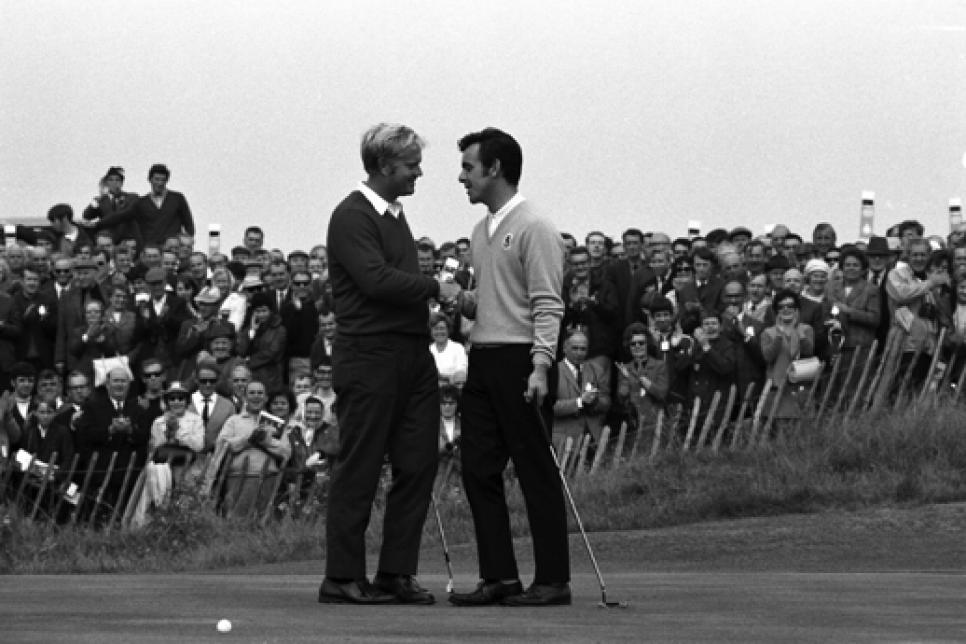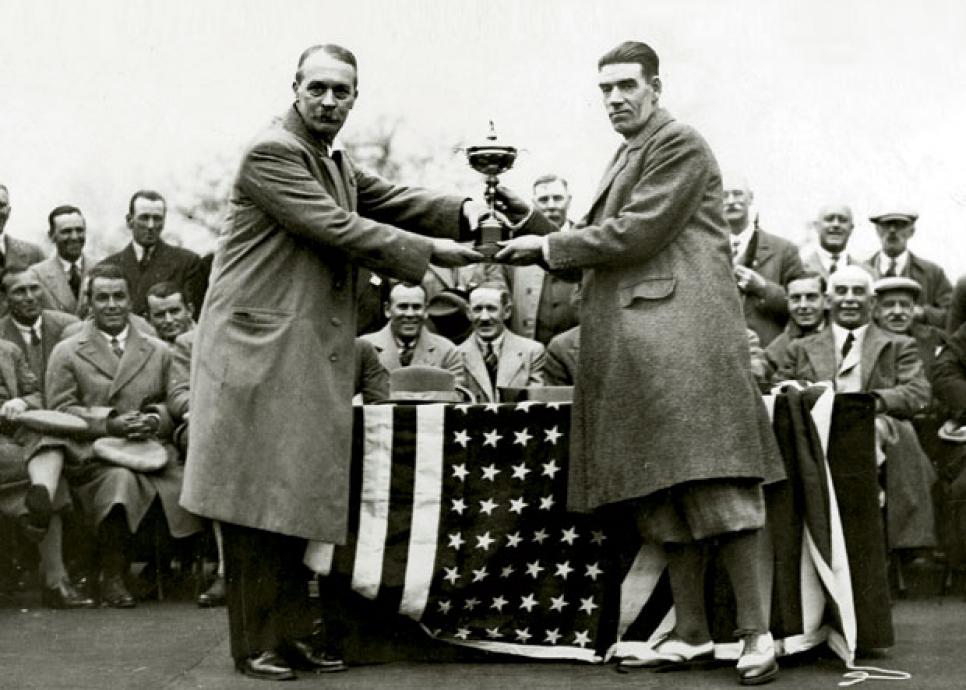Memory Lane
Ryder Cup 2023: Rickie Fowler adds his name to the most controversial concessions (and non-concessions) in Ryder Cup history

Andrew Redington
As the great William Shakespeare once wrote, "To give or not to give? That is the question." Or, something like that. On a serious note, it's a question that comes up often in match play. And in no event is it scrutinized more than the Ryder Cup.
The biennial match is filled with territorial tension, drama and plenty of testy three-footers that most hackers just scoop up in their normal weekend games. But when there's actually something on the line, golfers must wait for a two-word phrase that's more delightful to the ears than anything Shakespeare ever penned: "That's good."
Through the years, these gimmes—or perceived gimmes—have created some memorable moments in the Ryder Cup, and the 2023 event was no different. The Europeans extended a three-decade-plus home winning streak on a three-footer that didn't even have to be struck.
This time, Tommy Fleetwood was the beneficiary of a generous concession from Rickie Fowler that clinched the cup for Europe on Sunday at Marco Simone. OK, so technically, it was listed at two feet, eight inches, and it's a putt that Fleetwood normally makes without thinking. But with the entire Ryder Cup on the line? Well, Paul Azinger among others would have liked to see Tommy make it.
It's also very likely Europe, which wound up winning 16½-11½, would have walked away with the cup anyway. Still, this one will go down in Ryder Cup lore. And although this example nor anything else has quite reached the level of controversy of the 2015 Solheim Cup's "Gimmegate" involving Suzann Pettersen, there have been some awkward situations. Here are five others that still stand out years—and, in some cases, decades—later.
1. Jack Nicklaus vs. Tony Jacklin (1969)

Uncredited
Of course, any list involving concessions has to start with THE Concession that ended the 1969 Ryder Cup in a tie. It was Nicklaus who magnanimously gave Jacklin a two-footer on the final hole to halve the match, a move that instantly put the American in the Sportsmanship Hall of Fame (if there was such a thing). So why is this controversial? Because many of Nicklaus' teammates were NOT happy about the Golden Bear getting all warm and fuzzy in the heat of battle—especially during what had been a particularly testy event. While the U.S. retained the Ryder Cup with a 16-16 tie, the move prevented the squad from potentially winning that year’s matches outright—and no one was more upset than U.S. captain Sam Snead. "When it happened, all the boys thought it was ridiculous to give him that putt," Snead famoulsy said. "We went over there to win, not to be good ol' boys."
2. Nick Faldo vs. Paul Azinger (1993)

David Cannon
Azinger is arguably the biggest Ryder Cup pest—and certainly one of the event’s biggest hotheads—but in this case, he seems to have a good, um, case. With the Americans already guaranteed to retain the Cup, Faldo convinced Zinger to give him a five-foot putt on 18 in what had been a tremendous singles match highlighted by a hole-in-one by the Brit on No. 14. Azinger contends Faldo incorrectly claimed the U.S. had also won outright. "I can't tell you how irritating that was," said Azinger, who found out from teammate Davis Love III that the competition was still tied. Moments later, Faldo also didn't return the favor for Azinger's final par putt. Azinger holed the putt then said after that giving it to him “would have been the gracious gesture.” Speaking of gracious gestures ...
3. Payne Stewart vs. Colin Montgomerie (1999)

Craig Jones
With the final Sunday singles match in a similar situation six years later after the U.S. had wrapped up a dramatic comeback victory at Brookline, Stewart conceded a tied match to Montgomerie with both putting for birdie on the 18th green. It was a classy move that received almost as much praise as Stewart's “You’re going to be a dad” talk to Phil Mickelson after beating him at Pinehurst earlier that year to win the U.S. Open. And it meant even more to Monty due to the heckling he had received from the American crowds all day. "He’d had enough, I’d had enough, and he picked my ball up at the last," Montgomerie said. "I’ll never forget that. Not all the memories [from Brookline] are fond. But that match I will always think of with fond memories, of that game with him.” Sadly, it would be one of Stewart's last acts on a golf course of any kind as he died in a plane crash a month later.
4. Tiger Woods vs. Francesco Molinari (2012)

Jamie Squire
Woods’ Ryder Cup record has been greatly criticized through the years, but he might have been viewed differently had he been given a chance to play the hero at Medinah. Playing Sunday singles against Molinari it appeared the outcome of the entire match between the U.S. and Europe might come down to this final duel until a series of things broke Europe’s way, including Martin Kaymer delivering a clutch Cup-winning putt. Molinari could have pulled a Payne Stewart with this match not winding up deciding who would win the Cup, but he decided to press on, hoping to win the event outright for Europe. Then he could have pulled a Jack Nicklaus when Woods’ birdie chip lipped out to about four feet, but he didn’t, even with the European fans at Medinah starting the celebrations early and causing disturbances. After Woods missed for par, he conceded Molinari’s putt of a similar length to halve the match and give Europe a 14½-13½ victory.
5. Great Britain vs. Steel Shafts? (1929)

And finally, we’ll stretch the definition of "concession" to include Europe not making one to the U.S. in regard to their equipment for the second ever Ryder Cup. You see, the Americans arrived at Moortown Golf Club in England with steel-shafted clubs that were already approved for play by the USGA. But because the R&A hadn’t ruled them legal yet, Europe refused to let the Americans use them. The Americans wound up losing 7-5, and the R&A wound up allowing steel shafts the following year.

